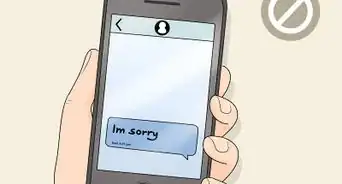This article was co-authored by Moshe Ratson, MFT, PCC. Moshe Ratson is the Executive Director of spiral2grow Marriage & Family Therapy, a coaching and therapy clinic in New York City. Moshe is an International Coach Federation accredited Professional Certified Coach (PCC). He received his MS in Marriage and Family Therapy from Iona College. Moshe is a clinical member of the American Association of Marriage and Family Therapy (AAMFT), and a member of the International Coach Federation (ICF).
There are 7 references cited in this article, which can be found at the bottom of the page.
This article has been viewed 54,128 times.
Everyone makes mistakes in friendships. Just like with school or a job, it can take some practice to become a really good friend. If you’ve done something that’s caused your friend to stop trusting you, it doesn’t mean the friendship is over. Instead, it’s time for you to apologize, be patient, and earn that trust back.
Steps
Making Genuine Apologies
-
1Admit your wrongdoing. If you spilled a secret or gossiped about your friend, own up to it. The sooner the truth is out in the open, the sooner you can apologize and start to repair your friendship. By confessing what you did, you will show your friend that you are remorseful, honest, and eager to make things right.[1]
- For example, you might say something like, “Krista, I have something to tell you. I told Jennifer about that secret that you told me.”
- This may seem to make things worse instead of better. And it might– at first! However, your friend will eventually realize that you are an honest and good friend who will be truthful and upfront in uncomfortable situations.
-
2Explain why you betrayed their trust. This can sometimes be a tricky thing to pinpoint, and an even harder thing to admit. Think long and hard about why you did whatever you did. Did you tell one of their secrets because you were mad at them for something? Were you trying to fit in with a crowd by talking poorly about them? Figure out why you betrayed their trust, and tell them.[2]
- For example, you might say something like, “I didn’t mean to tell Jennifer what you said. It just came out.”
- This doesn’t mean you should make excuses for your behavior. Rather, it just shows your friend that you recognize where you went wrong, and why.
Advertisement -
3Tell them their feelings are completely valid. If they’re angry and refusing to speak with you, tell them that you understand why. If they’re upset, tell them you would be upset too in their shoes.[3] Your friend needs to know that you completely acknowledge how they feel and are at their mercy.
- For example, you might say something like, “You have every right to be angry at me and hurt by what I did.”
- If you try to downplay their hurt feelings, you will only make them defensive. Even if you think they’re being dramatic or over-the-top, just bite your tongue if you truly want to earn your friend’s trust back.
-
4Apologize for your actions. After you have explained what you did and why, you will need to make a sincere apology for your actions. Your apology does not need to be anything fancy. It can just be something simple and straightforward, but you may also want to let your friend know that you want to earn back his or her trust.
- For example, you might say, “I am sorry for what I did and for how it has affected you. I want to try to regain your trust, and I hope you are willing to let me try."[4]
Easing Back Into It
-
1Give your friend time. You won’t be able to earn their trust back overnight. This doesn’t mean to ignore your friend or stop spending time with them. Instead, just realize that they may not be spilling their heart out to you right away. Show your friend that you’re not going anywhere and that you truly appreciate and treasure their friendship. Eventually, they’ll open back up.
- Be consistent. Don’t flake on plans or neglect your friend when they may need you. Show that you’re loyal and show that you’re dependable.
-
2Have a conversation about trust. Talking with your friend about what trust means to both of you may help you to ensure that you do not break your friend’s trust again.[5] Try talking with your friend about what behaviors indicate trust to her and what behaviors would be a betrayal of trust. Ask her what she needs from you to feel safe enough to continue your friendship.
- For example, your friend might indicate that she defines trustworthy behavior as keeping her secrets, being open and honest with her, and never saying negative things about her behind her back.
- Your friend might also define untrustworthy behavior as keeping secrets from her, lying to her, or speaking ill of her behind her back.
- Your friend might request that you tell her the next time that someone is gossiping about her, even if you think the news might hurt her feelings.
-
3Show them your trustworthiness. If you tell your friend someone else’s secrets, or spend your time gossiping about others, you aren’t demonstrating that you are a person of integrity or loyalty. If you betray other people, your friend may assume you’ll betray them too. The most important thing you can do is to show your friend that you’ve learned from your mistake.
- This can be a hard habit to break, but really focus on speaking only positively when you’re around this friend.
-
4Confide in your friend. By allowing yourself to be open and vulnerable around your friend, you’ll show them that you trust them. You’ll create an environment of sharing, and that will help them warm back up to you. Trust is mutual, and if you start revealing things to them, they will be more likely to reveal things to you.[6]
- Exposing secrets and flaws to other people requires courage. By showing courage and trusting in your friend, you’ll hopefully give them that same courage to trust in you.
-
5Try to be patient.[7] Building trust can be a long, challenging process. This is especially true if someone has experienced a significant betrayal.[8] Try to be patient with your friend as you work to regain your friend’s trust.
- Try to be as dependable and consistent as possible when working to rebuild your friend’s trust in you. Keep the promises you make and follow through when you say that you will do something.
Following Through on Promises
-
1Stay true to your word.[9] Your friend may forgive you and begin trusting you again, but they may not do it a second time or a third time. You need to stick to your promises and keep their secrets private.[10] It doesn’t matter if they make you mad, tell you the juiciest secret of all time, or spill one of your secrets– you will never win by being a gossipy or untrustworthy person.
-
2Set goals for yourself. If you have a bad habit of talking about others or spilling secrets, own up to it and make a change. Make a goal of not talking about anyone else for one day, then a week, and so on. Challenge yourself to talk about personal experiences, or ask others about theirs, instead of talking about people who aren’t around.[11] Eventually, you’ll break the habit.
- If you’ve earned your friend’s trust back and you want to keep it, you must change your behavior so it doesn’t happen again.
-
3Walk in their shoes. Remember how it felt when someone gossiped about you or told one of your secrets. It probably didn’t feel very good. Remember that feeling, and use it as motivation to not make others feel that bad. You don’t want to be known as a mean or catty person, so aim to be a friend that makes people feel happy, loved, and safe.
Expert Q&A
Did you know you can get expert answers for this article?
Unlock expert answers by supporting wikiHow
-
QuestionHow can I get my friends to trust me?
 Moshe Ratson, MFT, PCCMoshe Ratson is the Executive Director of spiral2grow Marriage & Family Therapy, a coaching and therapy clinic in New York City. Moshe is an International Coach Federation accredited Professional Certified Coach (PCC). He received his MS in Marriage and Family Therapy from Iona College. Moshe is a clinical member of the American Association of Marriage and Family Therapy (AAMFT), and a member of the International Coach Federation (ICF).
Moshe Ratson, MFT, PCCMoshe Ratson is the Executive Director of spiral2grow Marriage & Family Therapy, a coaching and therapy clinic in New York City. Moshe is an International Coach Federation accredited Professional Certified Coach (PCC). He received his MS in Marriage and Family Therapy from Iona College. Moshe is a clinical member of the American Association of Marriage and Family Therapy (AAMFT), and a member of the International Coach Federation (ICF).
Marriage & Family Therapist
-
QuestionHow do I win someone's trust?
 Moshe Ratson, MFT, PCCMoshe Ratson is the Executive Director of spiral2grow Marriage & Family Therapy, a coaching and therapy clinic in New York City. Moshe is an International Coach Federation accredited Professional Certified Coach (PCC). He received his MS in Marriage and Family Therapy from Iona College. Moshe is a clinical member of the American Association of Marriage and Family Therapy (AAMFT), and a member of the International Coach Federation (ICF).
Moshe Ratson, MFT, PCCMoshe Ratson is the Executive Director of spiral2grow Marriage & Family Therapy, a coaching and therapy clinic in New York City. Moshe is an International Coach Federation accredited Professional Certified Coach (PCC). He received his MS in Marriage and Family Therapy from Iona College. Moshe is a clinical member of the American Association of Marriage and Family Therapy (AAMFT), and a member of the International Coach Federation (ICF).
Marriage & Family Therapist
References
- ↑ http://www.oprah.com/spirit/The-Art-of-an-Apology
- ↑ http://www.oprah.com/spirit/The-Art-of-an-Apology
- ↑ http://nymag.com/scienceofus/2014/10/trick-that-will-make-your-next-apology-better.html
- ↑ https://powertochange.com/sex-love/5-apologies-that-always-work/
- ↑ Moshe Ratson, MFT, PCC. Marriage & Family Therapist. Expert Interview. 7 August 2019.
- ↑ http://michaelhyatt.com/how-to-build-trust.html
- ↑ Moshe Ratson, MFT, PCC. Marriage & Family Therapist. Expert Interview. 7 August 2019.
- ↑ https://www.psychologytoday.com/blog/turning-point/201404/5-strategies-build-trust-and-increase-confidence
- ↑ Moshe Ratson, MFT, PCC. Marriage & Family Therapist. Expert Interview. 7 August 2019.
-Step-1.webp)
-Step-2.webp)
-Step-3.webp)
-Step-4.webp)
-Step-5.webp)
-Step-6.webp)

-Step-7.webp)
-Step-8.webp)
-Step-9.webp)
-Step-10.webp)
-Step-11.webp)
-Step-12.webp)






























































